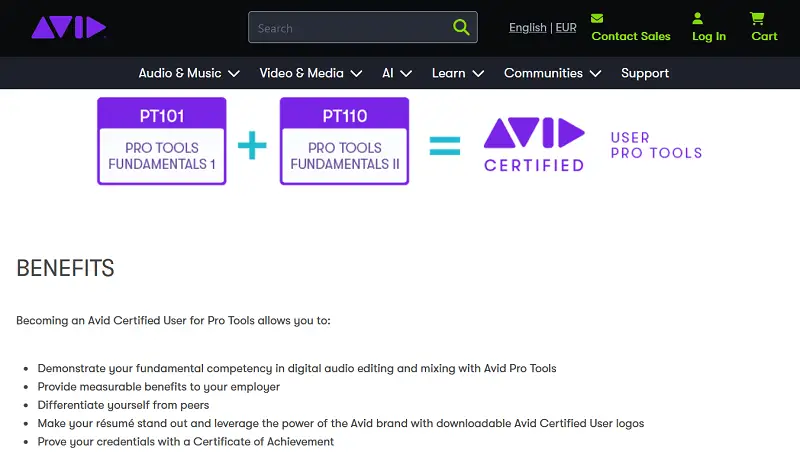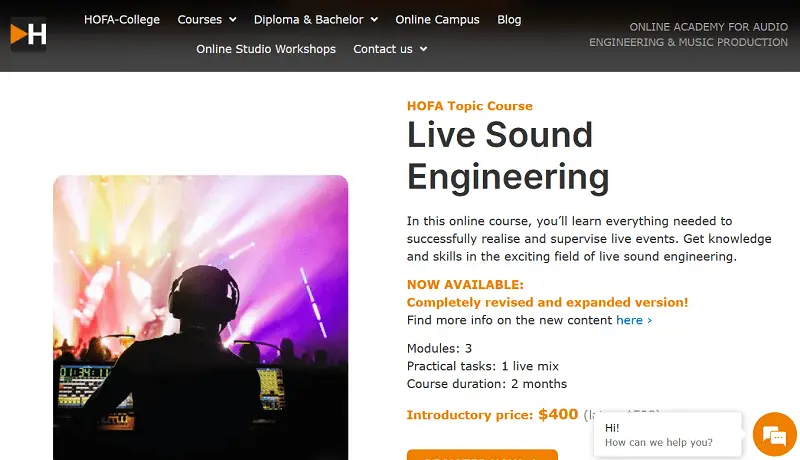The role of an audio engineer is pivotal to creating high-quality sound experiences across various media.
As technology continues to evolve, so does the demand for skilled professionals who can expertly manage the technical aspects of sound. Obtaining an audio engineer certification is a key milestone for those looking to advance their careers in this dynamic field.
In this article, we will explore the types of audio technician trainings, the pathways to get them, and the benefits they offer.
Basic audio engineering certificates
1. Certified Audio Engineer (CAE)
The CAE is designed for audio professionals working in the broadcast and media production sectors.
This music certification covers various aspects of audio engineering, including signal flow, equipment operation, and troubleshooting. The credential ensures that engineers are well-versed in industry standards and practices.
Certification is valid for five years. Update requires proof of continuous education or work experience, and there is a renewal fee.
%20requirements.webp)
- Issuing Authority: Society of Broadcast Engineers (SBE)
- Cost: Approximately $300 - $400, including the application and exam fees
- Requirements: Candidates must have at least two years of professional experience in broadcasting
Needed For:
- Broadcast engineers
- Media production technicians
- Anyone working in radio, television
- Live sound technicians managing concert or event audio setups
- Audio post-production specialists involved in editing and mixing for film or TV
2. Pro Tools Certification
Avid's audio certification course validates your expertise in using Pro Tools software, a leading digital sound workstation. Certification levels include User, Operator, and Expert, each demonstrating different stages of proficiency with the program's features and capabilities.
Certification does not expire. Avid periodically updates the sound engineer training exams to reflect new app versions.

- Issuing Authority: Avid Technology
- Cost: User - $199, Operator - $299, Expert - $499
- Requirements: Knowledge and experience with Pro Tools
Needed For:
- Studio engineers
- Post-production engineers
- Sound designers
- Music producers
- Live sound engineers
3. Advanced Audio Engineer Certification
This certification focuses on advanced techniques, including mixing, mastering, and digital signal processing (DSP). It is designed for professionals who want to deepen their expertise and stay ahead in the evolving audio landscape.
Renewal policies vary by institution, but continuing education or re-certification exams might be required to stay current with new technologies.
- Issuing Authority: Various institutions, such as Berklee College of Music, SAE Institute
- Cost: Typically between $500 and $1,000, depending on the organization and the program’s duration
- Requirements: A strong background in basic audio engineering practices is necessary. Completion of foundational audio technician training is required. Many programs require candidates to complete a series of advanced coursework covering topics like mixing techniques, mastering, and DSP.
Needed For:
- Advanced audio engineers
- Studio engineers
- Audio consultants
- Sound mixers
- Mastering engineers
4. Certified Broadcast Radio Engineer (CBRE)
This audio engineering certificate validates expertise in areas such as broadcast transmission systems, studio equipment, signal propagation, and regulatory compliance.
The CBRE certification is intended to demonstrate proficiency in maintaining and operating broadcast equipment, ensuring high-quality radio transmissions.
The certificate in audio engineering is valid for five years. To renew it, professionals must provide evidence of continuing education courses, industry-related training, or additional work experience. There is also a renewal fee.
%20exam.webp)
- Issuing Authority: Society of Broadcast Engineers (SBE)
- Cost: $300 - $400
- Requirements: Two years of experience in radio engineering. Passing a comprehensive test covering radio broadcasting technologies and practices.
Needed For:
- Radio engineers
- Technical directors
- Broadcast engineers
- Transmission system operators
- Studio maintenance technicians
5. Live Sound Engineer Certification
This certification validates expertise in the setup, operation, and troubleshooting of live sound systems, including PA systems, mixing consoles, and audio routing.
The audio certification course covers critical areas such as live sound system design, signal flow, acoustics, and real-time problem-solving during live events.
Certification is generally valid for three to five years, with renewal pending verification of continued work experience or additional training.

- Issuing Authority: Various organizations, such as the Live Sound International or similar industry-recognized bodies
- Cost: Typically between $300 and $500
- Requirements: Hands-on work with live sound systems, either in a professional or educational setting. Taking a test covering live sound concepts, system setup, and troubleshooting techniques.
Needed For:
- Live sound engineers
- Concert sound technicians
- Event audio technicians
- FOH (Front of House) engineers
- Monitor engineers
The significance of audio engineer certifications
1. Validation of Expertise
Certifications serve as an official endorsement of your technical abilities and computer skills. They provide tangible proof of your competence in using specialized equipment, software, and techniques, offering employers and clients confidence in your skills.
2. Career Advancement
Holding an audio engineer certificate can significantly enhance your career prospects. It not only demonstrates a commitment to your profession but also opens doors to advanced job roles.
For those looking to progress from entry-level roles to senior positions, credentials can be a key factor in career advancement and salary increases.
3. Industry Recognition
Certifications from reputable organizations lend credibility and prestige to your professional profile.
These certifications are recognized across the industry, providing you with a benchmark of your knowledge.
4. Up-to-Date Skills
The audio engineering field is continually evolving with new technologies. Certifications often need ongoing education and testing on the latest industry developments, ensuring that your abilities remain current.
This continual learning process helps you stay at the forefront of the sphere, adapting to new tools and practices as they emerge.
5. Increased Job Opportunities
Many employers prefer music certifications for specific roles. By obtaining relevant certificates, you broaden your job prospects and increase your eligibility for roles that require specialized skills.
Sound technician trainings can also help you transition into new areas of the field or into roles with different requirements.
Audio Engineer Certifications: FAQ
- Is certification required to become an audio engineer?
- No, but it can give you a competitive edge in the job market. Many successful audio engineers have built careers based on experience and a strong portfolio of work rather than certificates.
- Can I get certified in multiple areas of audio engineering?
- Yes, for example, you could become certified in both music production using Pro Tools and in live sound engineering. Earning multiple certifications can increase your expertise and make you more versatile in the industry.
- Is there an age limit for pursuing music certifications?
- No, people of all ages can take exams and gain professional recognition in the field of audio engineering, as long as they meet the prerequisites.
Conclusion
The pursuit of audio certifications can be a pivotal step towards securing a rewarding and fulfilling career.
Achieving an audio engineering certificate not only enhances your technical proficiency but also distinguishes you from other candidates in a competitive job market.
As you explore job opportunities, consider how certifications align with your career goals and the requirements of the positions you are targeting.
Create your professional Resume in 10 minutes for FREE
Build My Resume



